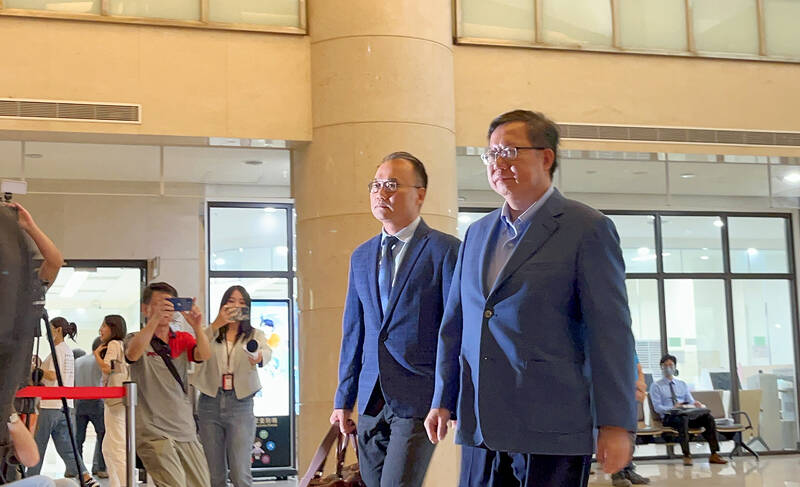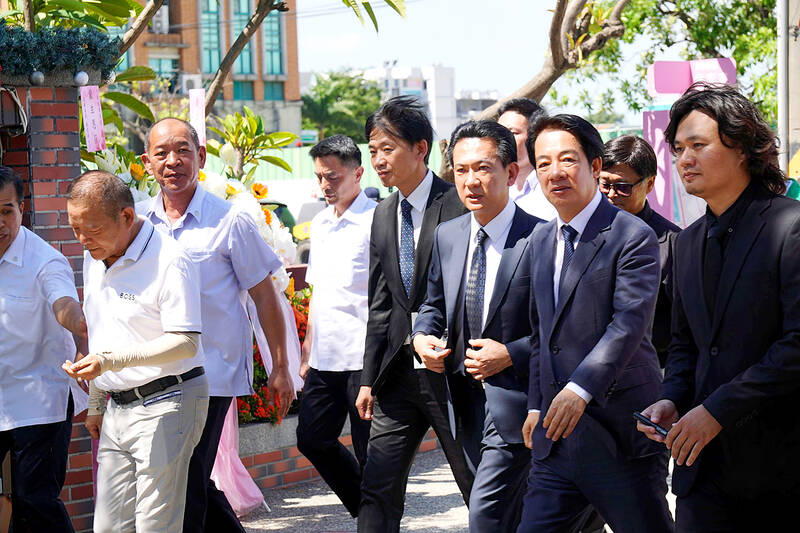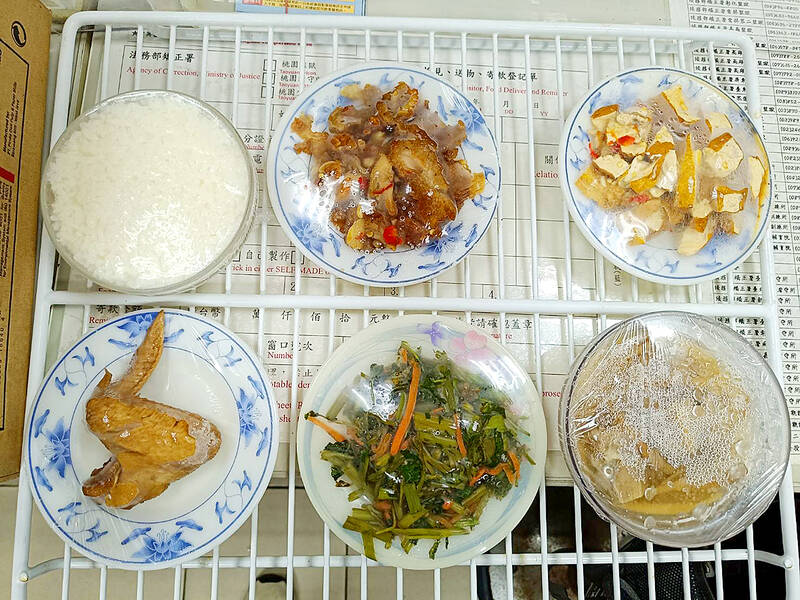Allegations of corruption against three heavyweight politicians from the three major parties are big in the news now. On Wednesday, prosecutors indicted Hsinchu County Commissioner Yang Wen-ke (楊文科) of the Chinese Nationalist Party (KMT), a judgment is expected this week in the case involving Hsinchu Mayor Ann Kao (高虹安) of the Taiwan People’s Party (TPP) and former deputy premier and Taoyuan Mayor Cheng Wen-tsan (鄭文燦) of the Democratic Progressive Party (DPP) is being held incommunicado in prison.
Unlike the other two cases, Cheng’s case has generated considerable speculation, rumors, suspicions and conspiracy theories from both the pan-blue and pan-green camps. The sense in the local media that there is some intrigue going on in Cheng’s detention is rife, but nothing has been proven.
Also unlike the other two cases where both are still in their jobs and out on bail, Cheng languishes in a four-person, unairconditioned prison cell. While the presumption of innocence until or unless found guilty applies to the other two, the High Court in justifying keeping Cheng in jail by stating that there is clear evidence substantiating serious suspicion regarding his guilt, regardless of Cheng’s protestations of innocence.

Photo: Cheng Shu-ting, Taipei Times
Unusually, after two rounds of being released on bail by lower courts, the High Court agreed with prosecutors allegations Cheng tampered with evidence by removing LINE messages on his phone, and that there are risks he could collude with witnesses or flee the country. Local press reports suggest he will be held incommunicado for at least two months in jail, and for some reason the press is obsessed with his diet and with the idea of him having to clean up vomit as part of his prison duties. None of those details should have been released to the press.
His party rights have been suspended by the DPP for three years, and if found guilty he will be expelled. Unable to do his job heading the Straits Exchange Foundation while being held incommunicado, he resigned that post.
LAI CONSOLIDATES POWER

Photo courtesy of reader
In spite of Cheng still yet to be convicted of anything, commentators and politicians are widely saying he has “fallen off the horse” (落馬), which is a term often used when a politician has been removed from office after a conviction for corruption. The underlying assumption in political commentary is that Cheng’s career is finished.
Seizing on the facts that Cheng’s case stems from an event from seven years ago, that Taoyuan prosecutors did examine the case around that time but backed away from it, that this happened so soon into President William Lai’s (賴清德) term, just a couple of weeks ahead of the DPP National Congress and that Cheng has been one of the few who could potentially challenge Lai in the party, commentators and politicians — mostly, but not exclusively on the pan-blue side — are suggesting this was engineered by Lai, using words like “purge.” Chinese Nationalist Party (KMT) legislative caucus convener Fu Kun-chi (傅崐萁) worried to the press that that he “hoped when Lai was done with his internal battles” he would not turn his attention to battling the opposition parties.
Similarly, KMT lawmaker and former KMT candidate for Tainan mayor Hsieh Lung-chieh (謝龍介) claimed that this was all a test of wills between former president Tsai Ing-wen (蔡英文), the Ing faction and William Lai as to whether Lai would “dare or not” to move against Cheng, who was also known to be close to Tsai, and headed a rival subfaction to Lai’s in the New Tide faction. Incidentally, Hsieh is a politician I have paid close attention to, even when he was only a Tainan city councilor, and he is a growing force on the KMT side to be reckoned with.

Photo: Cheng Shu-ting, Taipei Times
Others have speculated that during Tsai’s presidency, Taoyuan prosecutors were too afraid to go after Cheng because they worked well together and got along. These are just three of the man speculative theories or conspiracies floating around.
Much of the speculation by the pan-blue camp of purging going on in the DPP is based on their image of Lai as a ruthless operator. It is true he has shown he can be a cunning and somewhat unethical actor when he is determined, for example when he promised Tsai he would not challenge her in the 2019 primary but then entered the primary at the last minute, leaving Tsai just days to launch a counter-offensive. Lai also released a new book on the same day, demonstrating that he had long planned this ambush, and that his promise was by no means honest.
It is also true that Lai has packed the government and appointed heads of state-owned enterprises with a clear bias towards his own New Tide subfaction figures and loyalists. It is not hard to see how his political opponents would connect the timing of Cheng’s arrest and some of the unusual aspects of this case as a major power grab by Lai within the DPP to consolidate all power in his own hands.
Most likely, they are wrong. While the timing and incentives may be there for Lai to have intentionally “purged” Cheng, there is not actually any proof. It is more likely that the Taoyuan prosecutors simply acted on their own in enforcing the law.
While President Lai has shown he has sharp elbows and showed he can fight dirty if he has to, especially in the 2019 presidential primary, he is also a smart, successful and talented politician and even when fighting dirty has played by the rules.
Cheng was already weakened by a plagiarism scandal and in a less strong position to challenge Lai, who is both the president of the nation and party chair of the DPP. Cheng had already been demoted from vice premier to head of the Straits Exchange Foundation (SEF) by Lai, showing firmly who was in the driver’s seat.
If Lai had genuinely secretly got the Taoyuan prosecutor’s office to follow his orders, he would have been taking a massive risk for very little reward. If it were ever to get out that he illegally used his power as president to remove a rival of his in the party his career would be finished.
If Cheng is indeed found guilty, that would be another example. He was a potential future premier or even president, the NT$5 million he is being accused of having accepted is a pittance compared to his potential future earnings if his career is truly over.
TEARING DOWN THE DPP
There is also a theory floating around on the pan-green side that it was the KMT colluding with the Taoyuan prosecutor’s office to get Cheng arrested. In this scenario, Taoyuan County Commissioner Simon Chang (張善政) of the KMT might also be involved.
The idea is that they did it to “inflict heavy losses on the popularity of DPP governance,” “dissipate the DPP’s firepower” in the ongoing recall campaign against Keelung Mayor George Hsieh (謝國樑) and to knock out (literally using the English ‘KO’) the chances of the DPP winning the Taoyuan mayoral race in 2026.
This also seems highly unlikely because the timing makes little sense. The obvious timing to do this if the KMT were really behind it would have been prior to the presidential and legislative elections in January, prior to the recall signature campaign or nearer to the actual recall vote if the signature drive was successful (they are being counted now) or much closer to the November 2026 local elections.
Like Lai, the KMT are smart and politically savvy. If they had proof that Cheng was guilty of corruption, they would not illegally collude with the Taoyuan prosecutor’s office, they would hold a big press conference at a far more political advantageous time and get as much political theater out of it as they could – then very publicly give over the evidence to the prosecutors.
Though there are some odd things about Cheng’s case, and some of these scenarios are possible and intrigue does happen, in this case Occam’s Razor suggests the simplest explanation is the most likely, which is that the prosecutors are simply doing their job independently of any political interference.
At least we hope so.
Donovan’s Deep Dives is a regular column by Courtney Donovan Smith (石東文) who writes in-depth analysis on everything about Taiwan’s political scene and geopolitics. Donovan is also the central Taiwan correspondent at ICRT FM100 Radio News, co-publisher of Compass Magazine, co-founder Taiwan Report (report.tw) and former chair of the Taichung American Chamber of Commerce. Follow him on X: @donovan_smith.

Most heroes are remembered for the battles they fought. Taiwan’s Black Bat Squadron is remembered for flying into Chinese airspace 838 times between 1953 and 1967, and for the 148 men whose sacrifice bought the intelligence that kept Taiwan secure. Two-thirds of the squadron died carrying out missions most people wouldn’t learn about for another 40 years. The squadron lost 15 aircraft and 148 crew members over those 14 years, making it the deadliest unit in Taiwan’s military history by casualty rate. They flew at night, often at low altitudes, straight into some of the most heavily defended airspace in Asia.

Beijing’s ironic, abusive tantrums aimed at Japan since Japanese Prime Minister Sanae Takaichi publicly stated that a Taiwan contingency would be an existential crisis for Japan, have revealed for all the world to see that the People’s Republic of China (PRC) lusts after Okinawa. We all owe Takaichi a debt of thanks for getting the PRC to make that public. The PRC and its netizens, taking their cue from the Chinese Communist Party (CCP), are presenting Okinawa by mirroring the claims about Taiwan. Official PRC propaganda organs began to wax lyrical about Okinawa’s “unsettled status” beginning last month. A Global

Taiwan’s democracy is at risk. Be very alarmed. This is not a drill. The current constitutional crisis progressed slowly, then suddenly. Political tensions, partisan hostility and emotions are all running high right when cool heads and calm negotiation are most needed. Oxford defines brinkmanship as: “The art or practice of pursuing a dangerous policy to the limits of safety before stopping, especially in politics.” It says the term comes from a quote from a 1956 Cold War interview with then-American Secretary of State John Foster Dulles, when he said: ‘The ability to get to the verge without getting into the war is

Like much in the world today, theater has experienced major disruptions over the six years since COVID-19. The pandemic, the war in Ukraine and social media have created a new normal of geopolitical and information uncertainty, and the performing arts are not immune to these effects. “Ten years ago people wanted to come to the theater to engage with important issues, but now the Internet allows them to engage with those issues powerfully and immediately,” said Faith Tan, programming director of the Esplanade in Singapore, speaking last week in Japan. “One reaction to unpredictability has been a renewed emphasis on